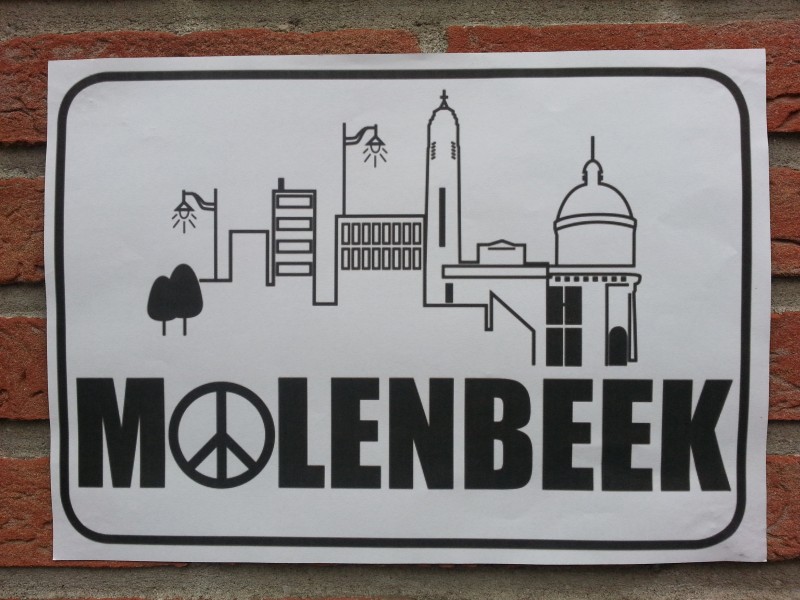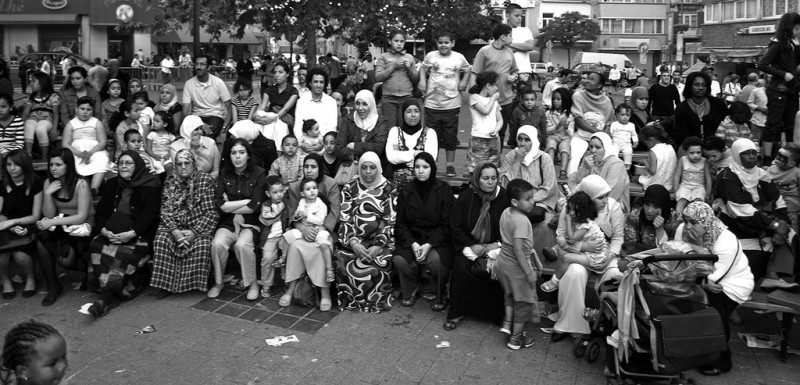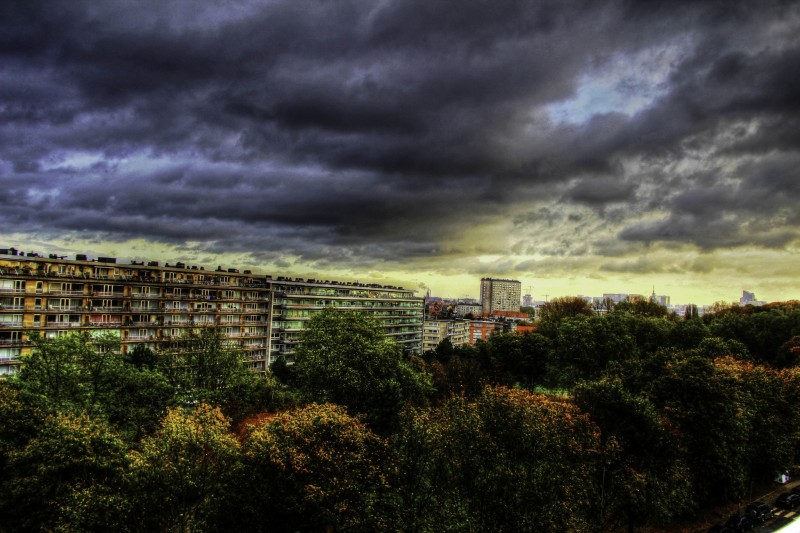 [1]
[1]Poster distributed at the “Molenbeek Shines a Light” demonstration, a tribute to the victims of the Paris attacks, held on November 18th in Molenbeek’s main square. Photo by the author.
Alors face à toutes les extrême droites, contre toutes les divisions et contre toutes les guerres, pour toutes les victimes de toutes les bombes partout dans le monde, de Paris à Alep en passant par Beyrouth et Ankara, nous, habitant.e.s de molenbeek et de toutes les communes de Bruxelles, nous lançons un appel à refuser la peur et la division, à célébrer l'unité et la solidarité pour un monde de justice et d'égalité.
Against all far-right extremists, against all divisions and against all wars, for all the victims of all bombs anywhere in the world, from Paris to Aleppo and Beirut to Ankara, the residents of Molenbeek and all the districts of Brussels are launching a call to reject fear and division, and to instead celebrate unity and solidarity on behalf of a more just and equal world.
This is the message that will be invoked by the “Rally for all victims, against all wars, for solidarity and against disunity [2]“, set to take place on November 25 in Molenbeek. The Belgian district has appeared repeatedly in media around the world since the November 13 attacks on Paris, and it's not the first time the name Molenbeek has surfaced in connection with various attacks perpetrated by militant jihadists around Europe.
The media has perpetuated an unsettling image of the district, one that its residents have rejected. On 18 November, about 2,000 people gathered [1] in Molenbeek’s central plaza to honor the victims of the attacks in Paris and to show a different side of the community than the one presented by the press.
Still, the reality of Molenbeek is extremely complex and cannot be expressed with simplistic descriptions and labels.
Molenbeek-Saint-Jean is one of 19 municipalities that make up the Brussels-Capital Region of Belgium, which serves as the headquarters of the European Commission [3], the Council of the European Union [4], the European Parliament [5], and NATO [6]. Brussels is less than two hours from Paris by the high-speed Thalys [7] train, as well as two hours from London via the Eurostar [8] that runs through the Channel Tunnel.
Located on the west side of Brussels, Molenbeek is one of the most economically depressed areas in Belgium. It has around 95,000 inhabitants, but its population density is double the average of the capital. It also has an enormously high unemployment rate of 31%, a rate which exceeds 40% among young people. Around 25% of the community’s population are foreign-born, with more than 100 nationalities represented. The district’s Muslim population is estimated at 40%, the second largest in the Brussels region, and is served by 20 mosques as compared to the five churches that serve the Christian majority (figures from 2013 [9]).
Amid a population vexed by an uncertain future, some have placed their hopes in radical currents of Wahhabi Islam. Supposed friendly countries finance the construction of mosques and send religious leaders who preach the most severe interpretations of Sharia [10]. In recent years, multiple militant jihadists have passed through the district, including those that took part in the bombings of Madrid [11] in 2004, the shooting at the Jewish Museum [12] in Brussels in 2014, the attack against the Parisian magazine Charlie Hebdo [13] in January of 2015, the Thalys train attack [14] in August of 2015, and the most recent November attack on the French capital. It is estimated that more than 400 Belgians have joined Daesh, also known as ISIS.
Journalist Mario Moratalla of Spanish news organization VozPópuli [15] opined that Molenbeek-Saint-Jean long ago became “a breeding ground of ethnic and cultural hatred disguised as class struggle”. Françoise Schepmans, the mayor of Molenbeek, further explained [16] the problem of radicalization within the commune:
On a assisté au cours de ces dernières décennies à un repli identitaire, un repli religieux. Puis, avec les évènements internationaux, à un fondamentalisme qui s'est parfois transformé en radicalisme violent
Je pense que les autorités n'ont pas suffisamment pris la mesure de ce phénomène. Et le politique n'a pas assuré l'intégration et l'accueil des personnes d'origines étrangères. Certains sont restés en marge de la société
In recent decades, we have witnessed identity-based isolationism, religious-based isolationism. And then, with international events, a fundamentalism that has sometimes transformed into violent radicalism. I don’t think the authorities have sufficiently estimated the reach of this phenomenon. And politicians have not ensured the integration and care of people of foreign origin. Many remain on the margins of society.

Molenbeek, Brussels. Attendees of the Music Festival in June of 2008. Photo by Lieven Soete on Flickr, licenced CC BY-NC-SA 2.0
Johan Leman, a Dominican priest, scholar of cultural anthropology and professor emeritus at the University of Leuven, has a profound understanding of the reality in Molenbeek. The organization that he chairs, Foyer, seeks to integrate minorities into the community. In an article [17] published in the Guardian, Leman emphatically asserted that despite appearances, the area is not at all a center for Daesh sympathizers.
For the authorities there is a double lesson: invest in the future of the children (improving schooling), so that young adults see a future for their children (if not for themselves). Secondly: show respect for the inhabitants. Avoid facile slogans like “we will clean up”. Stop treating people as potential murderers, because they are not. You need them as a social cushion against jihadi-recruiters, drug dealers and hate preachers.
Leman is referring to statements made by Jean Jambon, the Belgian interior minister, who a few hours after the attacks in Paris expressed his determination to “clean up Molenbeek.” Jambon has also admitted to the failure [18] of measures that had been introduced to combat radicalism following the dissolution of a jihadist cell in January. These measures included the employment of task forces to identify people who might turn to violence or travel to Syria.
Nevertheless, the media has largely neglected to address a problem that continues to afflict Belgium: how the complexity of Belgium’s political structure reduces the effectiveness of its security forces. The BBC took note [20] of this, writing:
Una de las dificultades que enfrenta el gobierno en controlar el radicalismo yace en la limitada efectividad de sus servicios de seguridad y de policía.
Bélgica está compuesta de dos principales nacionalidades rivales: la valona, de habla francesa, y la flamenca, de habla holandesa.
Para aliviar la tensión entre las dos, se le ha dado más independencia a los gobiernos locales, lo que ha creado varios niveles de burocracia.
Es una estructura muy densa para que fluya eficientemente la información de las agencias de inteligencia y que puedan operar y obtener resultados positivos.
One of the difficulties faced by the government in controlling radicalism lies in the limited effectiveness of its police and security services. Belgium is composed of two main rival nationalities: the French-speaking Walloon and the Dutch-speaking Flemish. To ease the tension between the two, more independence has been given to local governments, which has created various levels of bureaucracy. It is a very dense structure that hinders the efficient flow of information between intelligence agencies and the ability to operate and obtain positive results.
In addition to this, the borders of continental Europe lack cohesive units that can effectively control crime on an international scale. According to Jean-Charles Brisard [21], president of the French Center for Analysis of Terrorism:
(…) on est dans un phénomène qui concerne plusieurs pays européens et pas seulement les pays individuellement.
(…) y a des choses que la France et d’autres pays européens ont demandé à l’Union européenne de mettre en place depuis de nombreuses années pour accroître et systématiser un centre d’information, à travers Europol notamment, s’agissant des jihadistes.
L’Europe, malheureusement, dans le domaine de l’antiterrorisme, est une énorme force d’inertie jusqu’à ce jour.
[…] We are facing a phenomenon that affects several European countries, not just an individual country.
[…] For years, France and other European countries have asked the European Union to put certain measures into place to improve and systematize a center of information through Europol, since now we are dealing with jihadists. Unfortunately, when it comes to counterterrorism, Europe has so far been a largely inert force.
